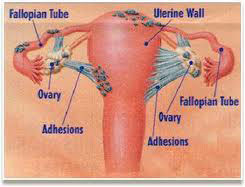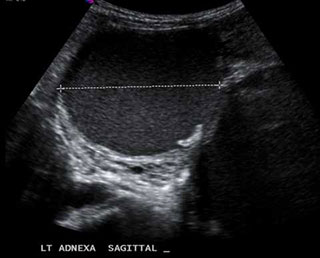Endometriosis

Endometriosis is a painful disorder where tissues that normally line the inside of the uterus (endometrium) grow outside the uterus. It most commonly affects the ovaries, intestines and pelvic tissues (the lower part of the abdomen's interior). Rarely, the tissues may spread beyond this region.
During the development of the disease, the endometrial tissues continue to act as they normally would inside the uterus, meaning they first grow, thicken, and then break down and bleed during each menstrual cycle. Since they have nowhere to exit the body, they accumulate in the organ where they have implanted. The hosting tissues become irritated, develop adhesions or scar tissue sticking organs together. All this causes pain, up to severe pain, especially during menstruation.
Symptoms and signs:
- Painful menstruation (dysmenorrhea), pelvic pain and cramps may start before and last several days into the cycle.
- Pain during or after sexual intercourse.
- Pain during bowel movements or urination, more pronounced during the menstrual cycle
- Excessive bleeding during the cycle or bleeding between cycles.
- Infertility
- Other symptoms include fatigue, diarrhea, constipation, abdominal bloating, nausea, especially during the cycle.
Causes
Endometriosis develops when one or more small areas of the abdominal lining turn into endometrial tissue. This is more likely when these cells derive from embryonic cells with the ability to take on the structure and function of endometrial cells. However, what activates this ability is still unknown. One of the explanations for the disease remains retrograde menstruation, in which menstrual blood containing endometrial cells flows back through the fallopian tubes and spreads into the pelvic cavity and beyond.
Risk factors
- one or more close relatives with the disease (mother, aunt, sister)
- menstrual cycle shorter than 27 days, with periods lasting over 8 days
- medical conditions that prevent the normal flow of menstrual blood
- past pelvic infections
Endometriosis develops several years after the onset of menstruation (menarche), temporarily subsides during pregnancy, and eases with the onset of menopause.
Complications
For pregnancy to occur, an egg released from the ovary must travel through the fallopian tube to that side, be fertilized by a sperm, go and implant in the uterus wall. Endometriosis, with its tissue reactions, can block the fallopian tubes or damage their end (fimbriae) preventing the egg from meeting the sperm, which could affect fertility. Approximately one-third to half of the women with endometriosis have difficulty becoming pregnant.
In women diagnosed with endometriosis, there is a noticeable increase in the susceptibility to some rare types of ovarian cancer.
DIAGNOSIS
Pelvic examination: during this examination, pelvic anomalies such as the presence of cysts, adhesion of surrounding organs to the uterus are looked for. However, it is often difficult to find damage, especially when small areas are affected.

Ultrasound via a transabdominal or transvaginal route show the presence of endometriotic cysts
Laboratory data: complete blood count to differentiate from pelvic infections, CA125 marker with low sensitivity, CCR1 mRNA marker with higher sensitivity.
Magnetic resonance imaging better determines the size, extent, and helps in setting the treatment strategy.
Laparoscopy is the only way to ensure the presence of endometriosis, its spread, and its treatment.
TREATMENT
Generally, conservative treatment is recommended first, followed by surgical treatment. However, everything depends on the severity of the disease, the symptoms, and the desire to have children.
For pain treatment, ibuprofen and any non-steroidal anti-inflammatory can be used
Hormonal therapy
Taking additional hormones is effective in reducing or eliminating pain
Contraceptives. (birth control pills, patch, or vaginal ring) control monthly endometrial changes, which reduces pain in mild to moderate cases.
Gonadotropin-releasing hormone (Gn-RH) agonists and antagonists.
These medications block the production of ovarian-stimulating hormones, lower estrogen levels, leading to a reduction in endometrial implants, and disease remission during use. These medications cause a state of premature menopause, often resulting in side effects such as hot flashes, vaginal dryness, mood changes.
Danazol. blocks the production of ovarian hormones stopping menstruation, easing endometriosis symptoms. However, Danazol is not the first choice due to side effects such as acne, and facial hair growth.
Medroxyprogesterone (Depo-Provera) is in injection form, stops menstruation, and inhibits the growth of endometrial implants but has side effects such as weight gain, bone production decrease, and depressive states.
Aromatase inhibitors. the use of this class of medications helps in easing pain associated with endometriosis. Their effect is achieved by blocking the conversion of androstenedione and testosterone into estrogen, thus blocking estrogen production by endometrial implants. To reduce their effect on bone loss and folliculin, these medications should be taken in combination with GnRH agonists or estrogen-progestin contraceptives.
Hormonal treatment is not permanent as symptoms may return after stopping their use!
Surgical treatment
It can be conservative treatment aiming at removing endometriosis patches, endometriotic cysts, or internal adhesions through laparoscopy or open surgery, preserving the integrity of the reproductive apparatus.
In severe cases of endometriosis, a total hysterectomy along with the removal of the ovaries may be required.
For a woman suffering from endometriosis, it is important to find a doctor with whom she feels comfortable and at ease, but at the same time, it’s crucial to get a second opinion before starting any treatment method. If pain persists, warm water baths which provide relaxation to pelvic muscles and reduce cramps can help. Acupuncture sessions also provide relief from pain.
Thank you very much for this information
Sent by aida, më 04 October 2013 në 15:06
beautiful as information but I want to know if total hysterectomy is performed is there any possibility of having other problems not from the removal of the organs but from endometriosis
Sent by sofije kryeziu, më 18 December 2013 në 11:36
The disease is very rare, perhaps also because it is very difficult to diagnose. I have suffered for several years from endometriosis (the lesion was near the scar from the surgery for the childbirth), I had very severe pains, especially before and during the cycle, I had swelling, a kind of gland on one side of the scar, which kept growing and no doctor suspected it was endometriosis, even though I underwent endless examinations... It seemed like no one believed I had so much pain, most thought it was just a fatty gland..
Sent by Blerta, më 11 December 2014 në 03:49
Good afternoon, Sofie! The removal of the uterus does not mean the disappearance of problems. Generally, endometriosis is accompanied by small, focal lesions, randomly spread throughout the abdominal cavity, and over time they cause various issues, such as: organ adhesions with cyclical pain, changes in bowel movements or urination, depending on the affected areas. In general, the remaining issues depend on the degree of endometriosis and the affected organ
Sent by kozeta, më 17 December 2014 në 09:21
I have endometriosis. If I get pregnant, will I have any problems since I plan to have another child?
Sent by aida, më 04 January 2015 në 14:37
Blerta, how did you solve your problem since I have the same problem as yours? In the corner of the operation wound, I have an endometriosis focus. I will remove it with surgery and hope it does not recur. I would be grateful if you could tell me how you acted and if you have any problems now. Thank you
Sent by Eralda, më 02 February 2015 në 12:35
Hello..I wanted to say that I have had 3 surgeries..okay but I still have abdominal swelling and strong pain that makes it impossible for me to breathe because of this very difficult illness and it's also hard for me to sleep peacefully because I'm in a lot of pain all the time
Sent by Qendresa , më 18 Agust 2016 në 14:28
Good evening Qendresa! Endometriosis is a chronic disease that causes a lot of distress for women who suffer from it. Through surgery, only the visible and large lesions are removed, but meanwhile, there are small foci that cannot be completely removed, therefore the discomfort continues. Often, it is necessary for the surgery to be followed by taking medication for a very long time, for years, in such a way as to improve life even slightly. You also need to adjust your lifestyle, diet, and physical activity. All these together can have a mitigating effect on your condition
Replay from Kozeta Mustafaraj, më 27 October 2016 në 15:00
I have been 7 months since I underwent a total hysterectomy because I was diagnosed with endometriosis. Can endometriosis recur because I am again experiencing pain, the same as before the surgery. I am 50 years old. I had the surgery abroad. Please tell me what I should do. Thank you!
Sent by Lindita, më 24 June 2019 në 13:20
Hello Lindita!
The pains after the surgery can have various origins.
Of course, there may be foci of endometriosis, but this cannot be predicted. You need to undergo a periodic check-up every 6 months for the disease you have
Replay from Dr. Kozeta Mustafaraj, më 28 June 2019 në 07:41
Good evening, I have been suffering from endometriosis for 8 years and have had 4 surgeries. However, I have not seen any results, and the endometriosis has recurred. The doctors have suggested that I have my uterus removed, saying there's no other option, and I have agreed. Please advise me, is this the right solution?
Sent by Florida, më 05 October 2019 në 18:40
Hello Florida!
When you decide to hold an event, there are many factors that influence this decision. And I don't know you, I don't know your history, your age, nothing practically.
Therefore, I can't help you!
Replay from Dr. Kozeta Mustafaraj, më 07 October 2019 në 08:35